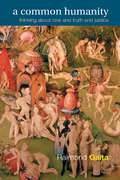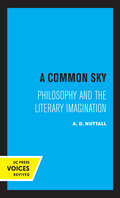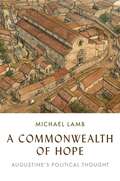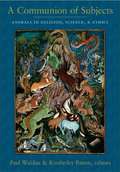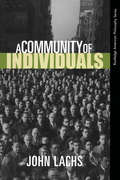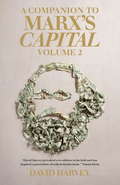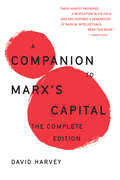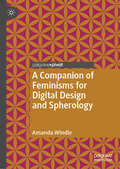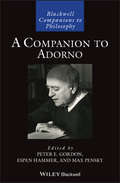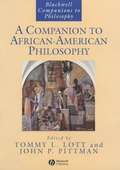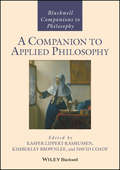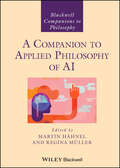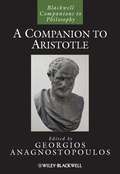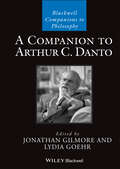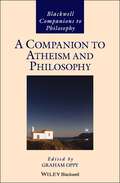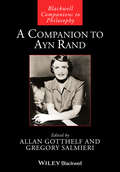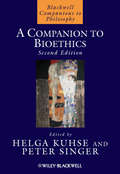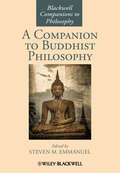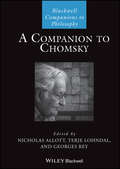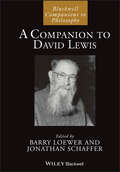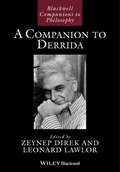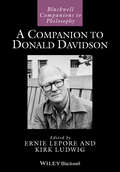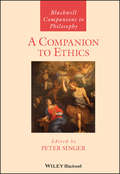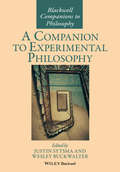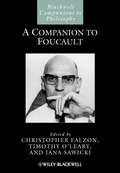- Table View
- List View
A Common Humanity: Thinking about Love and Truth and Justice
by Raimond GaitaThe Holocaust and attempts to deny it, racism, murder, the case of Mary Bell. How can we include these and countless other examples of evil within our vision of a common humanity? These painful human incongruities are precisely what Raimond Gaita boldly harmonizes in his powerful new book, A Common Humanity.Hatred with forgiveness, evil with love, suffering with compassion, and the mundane with the precious. Gaita asserts that our conception of humanity cannot be based upon the empty language of individual rights when it is our shared feelings of grief, hope, love, guilt, shame and remorse that offer a more potent foundation for common understanding. Drawing on the work of Hannah Arendt, Simon Weil, Primo Levi, George Orwell, Iris Murdoch and Sigmund Freud, Gaita creates a beautifully written and provocative new picture of our common humanity.
A Common Sky: Philosophy and the Literary Imagination
by A.D. NuttallThis title is part of UC Press's Voices Revived program, which commemorates University of California Press’s mission to seek out and cultivate the brightest minds and give them voice, reach, and impact. Drawing on a backlist dating to 1893, Voices Revived makes high-quality, peer-reviewed scholarship accessible once again using print-on-demand technology. This title was originally published in 1974.
A Commonwealth of Hope: Augustine's Political Thought
by Michael LambA bold new interpretation of Augustine&’s virtue of hope and its place in political lifeWhen it comes to politics, Augustine of Hippo is renowned as one of history&’s great pessimists, with his sights set firmly on the heavenly city rather than the public square. Many have enlisted him to chasten political hopes, highlighting the realities of evil and encouraging citizens instead to cast their hopes on heaven. A Commonwealth of Hope challenges prevailing interpretations of Augustinian pessimism, offering a new vision of his political thought that can also help today&’s citizens sustain hope in the face of despair.Amid rising inequality, injustice, and political division, many citizens wonder what to hope for in politics and whether it is possible to forge common hopes in a deeply polarized society. Michael Lamb takes up this challenge, offering the first in-depth analysis of Augustine&’s virtue of hope and its profound implications for political life. He draws on a wide range of Augustine&’s writings—including neglected sermons, letters, and treatises—and integrates insights from political theory, religious studies, theology, and philosophy. Lamb shows how diverse citizens, both religious and secular, can unite around common hopes for the commonwealth.Recovering this understudied virtue and situating Augustine within his political, rhetorical, and religious contexts, A Commonwealth of Hope reveals how Augustine&’s virtue of hope can help us resist the politics of presumption and despair and confront the challenges of our time.
A Communion of Subjects: Animals in Religion, Science, and Ethics
by Kimberley Patton Paul Waldau Eds.A Communion of Subjects is the first comparative and interdisciplinary study of the conceptualization of animals in world religions. Scholars from a wide range of disciplines, including Thomas Berry (cultural history), Wendy Doniger (study of myth), Elizabeth Lawrence (veterinary medicine, ritual studies), Marc Bekoff (cognitive ethology), Marc Hauser (behavioral science), Steven Wise (animals and law), Peter Singer (animals and ethics), and Jane Goodall (primatology) consider how major religious traditions have incorporated animals into their belief systems, myths, rituals, and art. Their findings offer profound insights into humans' relationships with animals and a deeper understanding of the social and ecological web in which we all live.Contributors examine Judaism, Christianity, Islam, Hinduism, Buddhism, Jainism, Daoism, Confucianism, African religions, traditions from ancient Egypt and early China, and Native American, indigenous Tibetan, and Australian Aboriginal traditions, among others. They explore issues such as animal consciousness, suffering, sacrifice, and stewardship in innovative methodological ways. They also address contemporary challenges relating to law, biotechnology, social justice, and the environment. By grappling with the nature and ideological features of various religious views, the contributors cast religious teachings and practices in a new light. They reveal how we either intentionally or inadvertently marginalize "others," whether they are human or otherwise, reflecting on the ways in which we assign value to living beings. Though it is an ancient concern, the topic of "Religion and Animals" has yet to be systematically studied by modern scholars. This groundbreaking collection takes the first steps toward a meaningful analysis.
A Community of Individuals
by John LachsFirst published in 2003. Routledge is an imprint of Taylor & Francis, an informa company.
A Companion To Marx's Capital, Volume 2
by David HarveyThe biggest financial crisis since the Great Depression shows no sign of coming to a close and Marx's work remains key in understanding the cycles that lead to recession. For nearly forty years, David Harvey has written and lectured on Capital, becoming one of the world's most foremost Marx scholars.Based on his recent lectures, and following the success of his companion to the first volume of Capital, Harvey turns his attention to Volume 2, aiming to bring his depth of learning to a broader audience, guiding first-time readers through a fascinating and hitherto neglected text. Whereas Volume 1 focuses on production, Volume 2 looks at how the circuits of capital, the buying and selling of goods, realize value.This is a must-read for everyone concerned to acquire a fuller understanding of Marx's political economy.
A Companion To Marx's Capital: The Complete Edition
by David HarveyThe radical geographer guides us through the classic text of political economy."My aim is to get you to read a book by Karl Marx called Capital, Volume 1, and to read it on Marx's own terms..." The biggest financial crisis since the Great Depression has generated a surge of interest in Marx's work in the effort to understand the origins of our current predicament. For nearly forty years, David Harvey has written and lectured on Capital, becoming one of the world's most foremost Marx scholars. Based on his recent lectures, this current volume aims to bring this depth of learning to a broader audience, guiding first-time readers through a fascinating and deeply rewarding text. A Companion to Marx's Capital offers fresh, original and sometimes critical interpretations of a book that changed the course of history and, as Harvey intimates, may do so again.
A Companion of Feminisms for Digital Design and Spherology
by Amanda Windle<p>This book questions if spherology is a philosophy for designers, giving guidance on ways to read Spheres, how to approach the trilogy’s indexicality, and apply the key tropes and ethics of atmospheres to digital design. Each chapter includes a design-in, that is a practical entry point into the many tropes of Spheres including― bubbles, globes and foam. The book also applies spherology to an atmosphere design issue involving endangered species and geospatial threats to the environment. <p>Spherology refers to the Spheres trilogy by the philosopher Peter Sloterdijk, which traces spherical ideas, theories, sensations and feelings related to the philosophical concept of ‘being’ and the human-centered position of ‘being-in’. It is the first cynical, feminist companion of spherology to take a practice-led approach and to cover all three controversial volumes to with and against Spheres. Windle draws on feminist science and technology studies (STS) through parody within reading, writing and design practices. Design provides navigation so that academics and students can engage with spherology through an embodied concern with digital materiality. <p>As a feminist companion for today’s design issues, the book is an essential read for feminist STS scholars, design practitioners and digital R&D specialists working both in industry and academia, including more specifically data visualisers, interface and interaction designers.</p>
A Companion to Adorno (Blackwell Companions to Philosophy)
by Espen Hammer Peter E. Gordon Max PenskyA definitive contribution to scholarship on Adorno, bringing together the foremost experts in the field As one of the leading continental philosophers of the last century, and one of the pioneering members of the Frankfurt School, Theodor W. Adorno is the author of numerous influential—and at times quite radical—works on diverse topics in aesthetics, social theory, moral philosophy, and the history of modern philosophy, all of which concern the contradictions of modern society and its relation to human suffering and the human condition. Having authored substantial contributions to critical theory which contain searching critiques of the ‘culture industry’ and the ‘identity thinking’ of modern Western society, Adorno helped establish an interdisciplinary but philosophically rigorous study of culture and provided some of the most startling and revolutionary critiques of Western society to date. The Blackwell Companion to Adorno is the largest collection of essays by Adorno specialists ever gathered in a single volume. Part of the acclaimed Blackwell Companions to Philosophy series, this important contribution to the field explores Adorno’s lasting impact on many sub-fields of philosophy. Seven sections, encompassing a diverse range of topics and perspectives, explore Adorno’s intellectual foundations, his critiques of culture, his views on ethics and politics, and his analyses of history and domination. Provides new research and fresh perspectives on Adorno’s views and writings Offers an authoritative, single-volume resource for Adorno scholarship Addresses renewed interest in Adorno’s significance to contemporary questions in philosophy Presents over 40 essays written by international-recognized experts in the field A singular advancement in Adorno scholarship, the Companion to Adorno is an indispensable resource for Adorno specialists and anyone working in modern European philosophy, contemporary cultural criticism, social theory, German history, and aesthetics.
A Companion to African-american Philosophy
by Tommy L. Lott John P. PittmanThis wide-ranging, multidisciplinary collection of newly commissioned articles brings together distinguished voices in the field of Africana philosophy and African-American social and political thought. Provides a comprehensive critical survey of African-American philosophical thought. Collects wide-ranging, multidisciplinary, newly commissioned articles in one authoritative volume. Serves as a benchmark work of reference for courses in philosophy, social and political thought, cultural studies, and African-American studies.
A Companion to Applied Philosophy
by Kimberley Brownlee David Coady Kasper Lippert-RasmussenApplied philosophy has been a growing area of research for the last 40 years. Until now, however, almost all of this research has been centered around the field of ethics. A Companion to Applied Philosophy breaks new ground, demonstrating that all areasof philosophy, including epistemology, metaphysics, philosophy of science, and philosophy of mind, can be applied, and are relevant to questions of everyday life. This perennial topic in philosophy provides an overview of these various applied philosophy developments, highlighting similarities and differences between various areas of applied philosophy, and examining the very nature of this topic. It is an area to which many of the towering figures in the history of philosophy have contributed, and this timely Companion demonstrates how various historical contributions are actually contributions within applied philosophy, even if they are not traditionally seen as such. The Companion contains 42 essays covering major areas of philosophy; the articles themselves are all original contributions to the literature and represent the state of the art on this topic, as well as offering a map to the current debates.
A Companion to Applied Philosophy of AI (Blackwell Companions to Philosophy)
by Martin Hähnel Regina MüllerA comprehensive guide to AI's ethical, epistemological, and legal impacts through applied philosophy Inartificial intelligence (AI) influences nearly every aspect of society. A Companion to Applied Philosophy of AI provides a critical philosophical framework for understanding and addressing its complexities. Edited by Martin Hähnel and Regina Müller, this volume explores AI's practical implications in epistemology, ethics, politics, and law. Moving beyond a narrow ethical perspective, the authors advocate for a multi-faceted approach that synthesizes diverse disciplines and perspectives, offering readers a nuanced and integrative understanding of AI's transformative role. The Companion explores a broad range of topics, from issues of transparency and expertise in AI-driven systems to discussions of ethical theories and their relevance to AI, such as consequentialism, deontology, and virtue ethics. Filling a significant gap in the current academic literature, this groundbreaking volume also addresses AI's broader social, political, and legal dimensions, equipping readers with practical frameworks to navigate this rapidly evolving field. Offering fresh and invaluable insights into the interplay between philosophical thought and technological innovation, A Companion to Applied Philosophy of AI: Features contributions from leading philosophers and interdisciplinary experts Offers a unique applied philosophy perspective on artificial intelligence Covers diverse topics including ethics, epistemology, politics, and law Encourages interdisciplinary dialogue to better understand AI's profound implications for humanity A Companion to Applied Philosophy of AI is ideal for undergraduate and graduate courses in applied philosophy, AI ethics, political theory, and legal philosophy. It is also a vital reference for those working in areas including AI policy, governance, and interdisciplinary research.
A Companion to Aristotle (Blackwell Companions to Philosophy #51)
by Georgios AnagnostopoulosThe Blackwell Companion to Aristotle provides in-depth studies of the main themes of Aristotle's thought, from art to zoology. The most comprehensive single volume survey of the life and work of Aristotle Comprised of 40 newly commissioned essays from leading experts Coves the full range of Aristotle's work, from his 'theoretical' inquiries into metaphysics, physics, psychology, and biology, to the practical and productive "sciences" such as ethics, politics, rhetoric, and art
A Companion to Arthur C. Danto (Blackwell Companions to Philosophy)
by Lydia Goehr Jonathan GilmoreA Companion to Arthur C. Danto paints a detailed portrait of one the most significant figures in twentieth-century philosophy and art criticism, offering unparalleled coverage of all aspects of Danto’s writings, artworks, and thought. Edited by two long-time colleagues of Arthur Danto, this interdisciplinary resource presents more than 40 original essays from both prominent Danto scholars and leading practitioners from various sub-fields of philosophy. The Companion illuminates Danto’s many contributions to the artworld, aesthetics, criticism, and philosophy of knowledge, action, science, history, and politics. The essays explore central concepts and intersecting themes in Danto’s writings while providing new interventions into the areas of philosophy in which Danto engaged. Topics include Danto’s mode of writing and art production, his critical engagement with artists and philosophers, conflicts in Danto’s views and in interpretations of his works, and much more. An important addition to Danto studies, A Companion to Arthur C. Danto is essential reading for practitioners, scholars, and advanced students looking for a critical, provocative, and insightful treatment of Danto’s philosophy, art, and criticism.
A Companion to Atheism and Philosophy (Blackwell Companions to Philosophy)
by Graham OppyPhilosophers throughout history have debated the existence of gods, but it is only in recent years that the absence of such a belief has become a significant topic of philosophical analysis, in particular for philosophers of religion. Although it is difficult to trace the historical contours of atheism as the lack of belief in a higher power, the reasoned, reflective, and thoughtful rejection of theism has become commonplace in many modern intellectual circles, including academic philosophy where disciplinary data indicates that a large majority of philosophers self-identify as atheists. As the first book of its kind to bring together a collection of writing on the philosophical aspects of atheism both historical and contemporary, the Companion to Atheism and Philosophy stages an explicit, constructive, and comprehensive conversation between philosophy and atheism to examine the ways in which atheist thought intersects with ideas and positions from a variety of philosophical and theological sub-disciplines. <P><P> The Companion begins by addressing the foundational questions and lingering controversies which underpin philosophical thought about atheism, exploring the implications of major developments in the history of philosophy for the modern atheistic worldview. Divided into eight distinct sections, essays consider a range of thinkers who were widely believed to have been atheists—including David Hume, Mary Wollstonecraft, Karl Marx, and Elizabeth Cady Stanton—and survey different kinds of objections to theism and atheism, including logical, evidential, normative, and prudential. Later chapters trace the relationship between atheism and metaphysics, epistemology, ethics, and political philosophy oriented around topics such as pragmatism, postmodernism, freedom, education, violence, and happiness. <P><P> Deftly curated and thoughtfully composed, A Companion to Atheism and Philosophy is the most ambitious and authoritative account of philosophical thinking on atheism available, and is a first-rate resource for academics, professionals, and students of philosophy, religious studies, and theology.
A Companion to Ayn Rand (Blackwell Companions to Philosophy)
by Allan GotthelfThe first volume to offer a comprehensive scholarly treatment of Rand’s entire corpus (including her novels, her philosophical essays, and her analysis of the events of her times), this Companion provides vital orientation and context for scholars and educated readers grappling with a controversial and understudied thinker whose enduring influence on American (and world) culture is increasingly recognized. The first publication to provide an in-depth scholarly treatment ranging over the whole of Rand’s corpus Provides informed contextual analysis for scholars in a variety of disciplines Presents original research on unpublished material and drafts from the Rand archives in California Features insightful and fair-minded interpretations of Rand’s controversial positions
A Companion to Bioethics
by Peter Singer Helga KuhseThis second edition of A Companion to Bioethics, fully revised and updated to reflect the current issues and developments in the field, covers all the material that the reader needs to thoroughly grasp the ideas and debates involved in bioethics.Thematically organized around an unparalleled range of issues, including discussion of the moral status of embryos and fetuses, new genetics, life and death, resource allocation, organ donations, AIDS, human and animal experimentation, health care, and teachingNow includes new essays on currently controversial topics such as cloning and genetic enhancementTopics are clearly and compellingly presented by internationally renowned bioethicistsA detailed index allows the reader to find terms and topics not listed in the titles of the essays themselves
A Companion to Buddhist Philosophy (Blackwell Companions to Philosophy #151)
by Steven M. EmmanuelA Companion to Buddhist Philosophy is the most comprehensive single volume on the subject available; it offers the very latest scholarship to create a wide-ranging survey of the most important ideas, problems, and debates in the history of Buddhist philosophy. Encompasses the broadest treatment of Buddhist philosophy available, covering social and political thought, meditation, ecology and contemporary issues and applications Each section contains overviews and cutting-edge scholarship that expands readers understanding of the breadth and diversity of Buddhist thought Broad coverage of topics allows flexibility to instructors in creating a syllabus Essays provide valuable alternative philosophical perspectives on topics to those available in Western traditions
A Companion to Chomsky (Blackwell Companions to Philosophy)
by Rey Allott Lohndal, Rey Allott LohndalA COMPANION TO CHOMSKY Widely considered to be one of the most important public intellectuals of our time, Noam Chomsky has revolutionized modern linguistics. His thought has had a profound impact upon the philosophy of language, mind, and science, as well as the interdisciplinary field of cognitive science which his work helped to establish. Now, in this new Companion dedicated to his substantial body of work and the range of its influence, an international assembly of prominent linguists, philosophers, and cognitive scientists reflect upon the interdisciplinary reach of Chomsky’s intellectual contributions.Balancing theoretical rigor with accessibility to the non-specialist, the Companion is organized into eight sections—including the historical development of Chomsky’s theories and the current state of the art, comparison with rival usage-based approaches, and the relation of his generative approach to work on linguistic processing, acquisition, semantics, pragmatics, and philosophy of language. Later chapters address Chomsky’s rationalist critique of behaviorism and related empiricist approaches to psychology, as well as his insistence upon a “Galilean” methodology in cognitive science. Following a brief discussion of the relation of his work in linguistics to his work on political issues, the book concludes with an essay written by Chomsky himself, reflecting on the history and character of his work in his own words.A significant contribution to the study of Chomsky’s thought, A Companion to Chomsky is an indispensable resource for philosophers, linguists, psychologists, advanced undergraduate and graduate students, and general readers with interest in Noam Chomsky’s intellectual legacy as one of the great thinkers of the twentieth century.
A Companion to David Lewis (Blackwell Companions to Philosophy)
by Jonathan Schaffer Barry LoewerIn A Companion to David Lewis, Barry Loewer and Jonathan Schaffer bring together top philosophers to explain, discuss, and critically extend Lewis's seminal work in original ways. Students and scholars will discover the underlying themes and complex interconnections woven through the diverse range of his work in metaphysics, philosophy of language, logic, epistemology, philosophy of science, philosophy of mind, ethics, and aesthetics. The first and only comprehensive study of the work of David Lewis, one of the most systematic and influential philosophers of the latter half of the 20th century Contributions shed light on the underlying themes and complex interconnections woven through Lewis's work across his enormous range of influence, including metaphysics, language, logic, epistemology, science, mind, ethics, and aesthetics Outstanding Lewis scholars and leading philosophers working in the fields Lewis influenced explain, discuss, and critically extend Lewis's work in original ways An essential resource for students and researchers across analytic philosophy that covers the major themes of Lewis's work
A Companion to Derrida (Blackwell Companions to Philosophy)
by Leonard Lawlor Zeynep DirekA Companion to Derrida is the most comprehensive single volume reference work on the thought of Jacques Derrida. Leading scholars present a summary of his most important accomplishments across a broad range of subjects, and offer new assessments of these achievements. The most comprehensive single volume reference work on the thought of Jacques Derrida, with contributions from highly prominent Derrida scholars Unique focus on three major philosophical themes of metaphysics and epistemology; ethics, religion, and politics; and art and literature Introduces the reader to the positions Derrida took in various areas of philosophy, as well as clarifying how derrideans interpret them in the present Contributions present not only a summary of Derrida’s most important accomplishments in relation to a wide range of disciplines, but also a new assessment of these accomplishments Offers a greater understanding of how Derrida’s work has fared since his death
A Companion to Donald Davidson (Blackwell Companions to Philosophy #125)
by Kirk Ludwig Ernie LeporeA Companion to Donald Davidson presents newly commissioned essays by leading figures within contemporary philosophy. Taken together, they provide a comprehensive overview of Davidson’s work across its full range, and an assessment of his many contributions to philosophy. Highlights the breadth of Davidson's work across philosophy Demonstrates the continuing influence his work has on the philosophical community Includes newly commissioned contributions from leading figures in contemporary philosophy Provides an in-depth exposition and analysis of Davidson's work across the range of areas to which he contributed, including philosophy of action, epistemology, metaphysics, philosophy of language, and philosophy of mind
A Companion to Ethics
by Peter SingerIn this volume, some of today's most distinguished philosophers survey the whole field of ethics, from its origins, through the great ethical traditions, to theories of how we ought to live, arguments about specific ethical issues, and the nature of ethics itself. The book can be read straight through from beginning to end; yet the inclusion of a multi-layered index, coupled with a descriptive outline of contents and bibliographies of relevant literature, means that the volume also serves as a work of reference, both for those coming afresh to the study of ethics and for readers already familiar with the subject.
A Companion to Experimental Philosophy
by John Buckwalter Justin SytsmaThis is a comprehensive collection of essays that explores cutting-edge work in experimental philosophy, a radical new movement that applies quantitative and empirical methods to traditional topics of philosophical inquiry. Situates the discipline within Western philosophy and then surveys the work of experimental philosophers by sub-discipline Contains insights for a diverse range of fields, including linguistics, cognitive science, anthropology, economics, and psychology, as well as almost every area of professional philosophy today Edited by two rising scholars who take a broad and inclusive approach to the field Offers a complete introduction for non-specialists and students to the central approaches, findings, challenges, and controversies in experimental philosophy
A Companion to Foucault (Blackwell Companions to Philosophy)
by Timothy O'Leary Christopher Falzon Jana SawickiA Companion to Foucault comprises a collection of essays from established and emerging scholars that represent the most extensive treatment of French philosopher Michel Foucault’s works currently available. Comprises a comprehensive collection of authors and topics, with both established and emerging scholars represented Includes chapters that survey Foucault’s major works and others that approach his work from a range of thematic angles Engages extensively with Foucault's recently published lecture courses from the Collège de France Contains the first translation of the extensive ‘Chronology’ of Foucault’s life and works written by Foucault’s life-partner Daniel Defert Includes a bibliography of Foucault’s shorter works in English, cross-referenced to the standard French edition Dits et Ecrits
